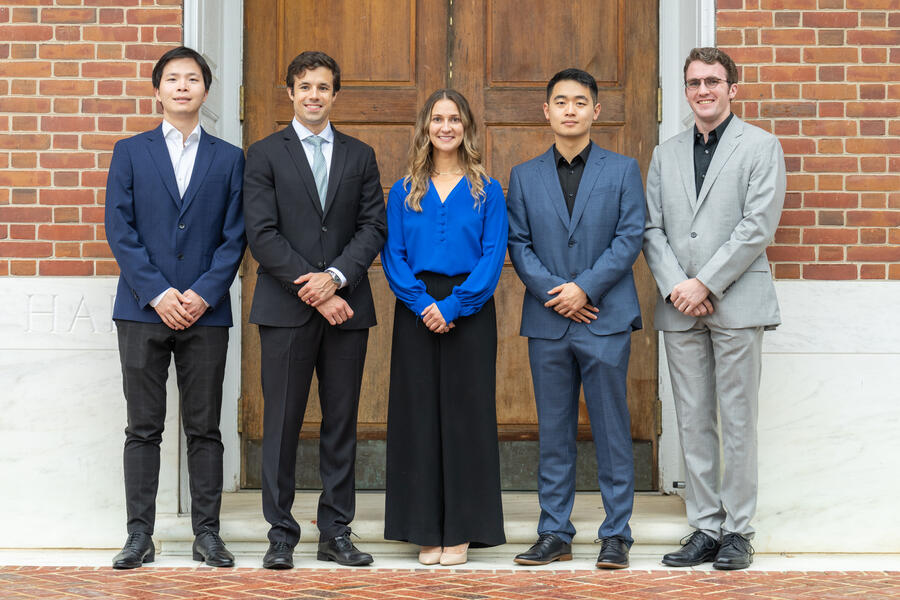Five Johns Hopkins doctoral students have been named 2025 Siebel Scholars, an honor that recognizes students in bioengineering fields for exemplary achievement in academia, research, and leadership.
Since its founding in 2000, the Siebel Scholarship has been awarded to 80 Johns Hopkins graduate students. Each year, around 100 scholars are selected from leading graduate schools to join a community of nearly 2,000 researchers, scholars, and entrepreneurs. Recipients receive a $35,000 award to support their final year of studies. Additionally, they are invited to attend annual conferences to discuss global issues alongside heads of state, scientists, and other experts seeking solutions to the world's most complex and pressing problems.
The 2025 Siebel Scholars are:
Jieneng Chen
Jieneng Chen is a PhD candidate in the Department of Computer Science working with Bloomberg Distinguished Professor Alan Yuille. His research focuses on artificial intelligence, computer vision, multimodality, embodied AI, and medical AI. He has published 11 first-authored papers in top AI venues including CVPR, ICCV, NeurIPS, ICML, MICCAI, and MedIA. His groundbreaking work, TransUNet, has initiated a new era for transformers in biomedical image analysis in 2021, garnering 4,200 citations in three years. Chen's dedication to using AI to tackle health inequities is evident in his role as a core member of the JHMI/Lustgarten FELIX pancreatic cancer detection project and his development of the first AI model capable of diagnosing eight common cancers. He is currently developing world models of the physical world with human-level intelligence. Chen has published 30+ peer-reviewed articles and leading conference papers, with a total of 10K citations and an h-index of 21 by October 2024.
Anastasia Georgiou
As a PhD candidate in the Department of Chemical and Biomolecular Engineering at Johns Hopkins, Anastasia Georgiou develops data-driven methods to accelerate dynamical system exploration and uncover hidden insights out of scrambled datasets. She has applied her research to a wide array of fields including protein folding, understanding hormone trajectories, and profiling patterns of single-cell motility. Georgiou has co-authored six publications, presented at five conferences, and received several fellowships including the NIH T32. She has used the leadership skills she acquired while in industry at ExxonMobil, Merck KGaA, and Google to contribute back to her school and community at large as lab captain, ChemBE Graduate Student Committee vice president, and director of Youth Education at a Baltimore area non-profit. She also volunteers as a Princeton University admissions interviewer, is a mentor with Women of Whiting, and captains a local soccer team.
Benjamin Killeen
Benjamin Killeen, a fifth-year PhD student at Johns Hopkins University, is passionate about the future of AI- and robot-assisted interventional healthcare. His recent work focuses on advancing physics- and learning-based simulations, ranging from single image formation to room-scale environments, to support intelligent assistance systems and immersive educational experiences. As a member of the Advanced Robotics and Computationally Augmented Environments (ARCADE) research group led by Mathias Unberath, he has received the Link Foundation Fellowship in Modeling, Simulation, and Training. Killeen has also served as the President of the LCSR Graduate Student Association and held various roles on the MICCAI Student Board. His professional experience includes internships with IBM Research - Almaden, Epic Systems, and Intuitive Surgical. In 2019, he graduated with Honors from the University of Chicago with a BA in Computer Science and a minor in Physics. In his free time, Killeen enjoys running, bouldering, and creative writing.
Denis Routkevitch
Denis Routkevitch is an MD/PhD student at Johns Hopkins University studying acute care of spinal cord injury. His thesis project involves the development of advanced techniques to regulate blood pressure and spinal cord blood flow in the early stages after injury. The multi-disciplinary and translational nature of research is directly influenced by both his background as a biomedical engineer and his clinical experience. Before starting his PhD, Routkevitch also completed his undergraduate years at Johns Hopkins, where he studied brain tumor immunology and developed novel nanoparticle gene delivery treatments. So far, his work has resulted in three first/co-first author publications, 21 coauthor publications, one patent, 21 conference presentations, and both the F30 and AHA fellowships. In addition to his research, Routkevitch is extremely passionate about mentoring. Throughout his PhD studies, he has mentored all levels—from high school students to those working towards their PhD.
Fangchi Shao
Fangchi Shao is a PhD candidate in Biomedical Engineering at Johns Hopkins University, working under Professor Jeff Wang. His research focuses on developing micro and nanoengineering technologies to advance high throughput screening, disease diagnosis, and nanomedicine manufacturing. His work has resulted in 10 first/co-first-authored publications (five journal articles and five conference proceedings) and 19 presentations. Shao has received prestigious awards, such as C.M. Ho Best Paper Award at IEEE NEMS 2020 and CHEMINAS Young Researcher Poster Award at MicroTAS 2022 and holds a patent for a novel sample-to-microfluidic interface. Beyond research, Shao is actively involved in community leadership, serving as vice president of the JHU Chinese Students and Scholars Association and director of BME EDGE and JHGCC. He organizes alumni sharing sessions and disseminates over 50 original educational articles, garnering over 200,000 views. Shao is also dedicated to mentoring and guiding BME graduate students in securing internships and navigating career pathways.
Posted in Science+Technology
Tagged siebel scholars, awards, graduate students








